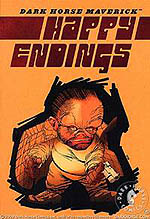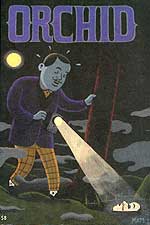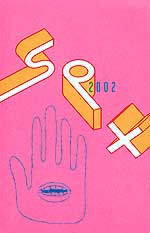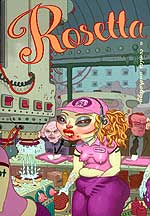
|
Editor Diana Schutz solicited work for "Happy Endings" (Dark Horse Comics; $9.95; 96pp.) that would, according to her, "somehow fit under the overarching umbrella" of the title. Interestingly, only a few of the contributions took the mandate literally. Harvey Pekar, of "American Splendor," proffers a disturbing piece about his mental breakdown and the return of a malignant tumor. He ends with "I'm trying to work my way through. What else is there?" Mixing independent newcomers with such big-name artists as Frank Miller ("The Dark Knight Strikes Back,") "Happy Endings" has the most mainstream appeal of the four anthologies. Miller's darkly funny piece is one "happy" ending after another like, "Once we squished the last of the little ones, we knew everything would be great!"
 "Orchid," comix version of Victoriana
"Orchid," comix version of Victoriana |
"Orchid," (Sparkplug Comic Books; $8; 116pp.) contains seven black and white adaptations of Victorian-era short stories, all of which involve shocking apparitions. It's a brilliant conceit by editors Ben Catmull and Dylan Williams. The most amusing of these is "Tobermory," adapted by Gabrielle Bell from a story by H.H. Munro, about a housecat who, upon being taught to speak, reveals its owner's most embarrassing secrets. Fantastic animals become a kind of sub-theme, as in David Lasky's adaptation of E.A. Poe's "The Raven." Testing the definition of a comic, instead of containing distinct images, the panels themselves form a picture when viewed as a whole. "Orchid" splendidly mixes modern comix storytelling with a bygone era's mastery of prose and atmosphere.
 SPX 2002 Anthology
SPX 2002 Anthology |
Comix' greatest bargain, "SPX 2002" gets you over 300 pages of engrossing comix for only ten bucks. If that doesn't make you feel good, the money you spend goes to the Comic Book Legal Defense Fund, a non-profit organization with the superheroic mission of defending the First Amendment rights of commix artists. Published in conjunction with the recent Small Press Expo (see TIME.comix coverage), "SPX 2002" has nearly fifty comix artists (most of them unknown) working in a short biographical format. Subjects run wildly from the man in the Godzilla suit to ethnobotonist Richard Evans Schultes to a stock-car-racing monkey named Jocko. Not only fun but educational — I was pleased to learn the origin of the Jacuzzi and the Leslie speaker — this clever theme limits the self-indulgence of the works and virtually forces creators to write linear narratives. You end up with such oddball delights as Nicky B.'s juvenile, hip-hop version of the old chestnut Davey Crocket story ("My hunting skills are badass!") Reading "SPX 2002," is like listening to a cover-song compilation by interesting bands you might not otherwise have the patience to fully invest in.

|
The best of the lot is "Rosetta" (Alternative Comics; $19.95; 194pp.), which is simply stunning. It combines the meticulousness of such handcrafted, small print-run books as Non with the availability of a trade paperback. Ng Suat Tong has sharply edited the selections for a variety of styles, subjects and cultures. Perfect for a newcomer, each contribution has a short accompanying intro to the artist. It mixes artists from Croatia, Hungary and Malaysia with many of America's new generation of comix creators. Tom Hart's fat, almost crude lines perfectly match the brutal ecstasy of his superb "Sandra Brown," a story of lust and mud. In one of the several non-fiction entries, Canadian David Collier boldly finds a parallel between himself and an Islamic fundamentalist. More abstract work keeps the book from being too didactic. Tobias Schalken, half of the experimental "Eiland" duo, contributes a story whose images complement each other when holding the page up to a bright light. The overt theme of "Rosetta" may a bit vague — the word appears in several entries, particularly as the name of a diner — but the covert theme, outstanding comix, can't be missed.
"Happy Endings," "Orchid," "SPX 2002," and "Rosetta," all make excellent comix cornucopias. Of the four, "SPX 2002" has the most bounty, but "Rosetta" has the tastiest selection.
